|
|
|
Sort Order |
|
|
|
Items / Page
|
|
|
|
|
|
|
| Srl | Item |
| 1 |
ID:
060244


|
|
|
| 2 |
ID:
114999
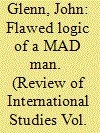

|
|
|
|
|
| Publication |
2011.
|
| Summary/Abstract |
In a recent issue of this journal Campbell Craig put forward an amended version of Power Preponderance theory seeking to explain why US unipolar predominance has turned out to be not simply a 'moment' and as such represents 'a serious anomaly for neorealist theory'. In using Waltz's own work on how nuclear weapons affect state behaviour, Craig appears to further bolster the case for Power Preponderance theory. Craig exploits what at first sight seems to be a contradiction in Waltz's work. However, Craig's error is that he treats security qua territorial security rather than considering a more encompassing view of state security. In the arena of 'secondary' security issues the usual logic of counter-balancing with conventional military forces still holds sway. This reply argues that a balance of power will return to the international system, it is just that at this moment no country or coalition of countries is quite up to the task.
|
|
|
|
|
|
|
|
|
|
|
|
|
|
|
|
| 3 |
ID:
141891
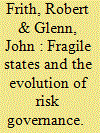

|
|
|
|
|
| Summary/Abstract |
Following the plane crashes into the twin towers of the World Trade Centre, Ulrich Beck claimed that the West would need to pursue ‘border-transcending new beginnings’ towards a more cosmopolitan world. Rather than any radical transformation along cosmopolitan lines, however, this paper maps a process of incremental reform and policy bricolage, where the post-cold war politics of intervention, and the securitisation of development, have been extended to encompass international terrorism in three overlapping phases. Although these overlapping phases – intervention, prevention and extension – are reflexive moments, they constitute a strengthening of the prevailing rationalities and technologies of risk rather than a radical rupture.
|
|
|
|
|
|
|
|
|
|
|
|
|
|
|
|
| 4 |
ID:
081221
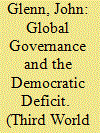

|
|
|
|
|
| Publication |
2008.
|
| Summary/Abstract |
This paper examines the democratic credentials of three key international institutions (the imf, World Bank and the wto) with regard to the majority of developing countries. In so doing the paper argues that we need to understand the democratic deficit of these institutions not only in terms of input legitimacy, but also in terms of output legitimacy and procedural fairness. The level and quality of these three aspects of democracy vary depending upon the international institution in question, but each of these institutions suffers from a democratic deficit in all three spheres. The paper therefore puts forward several reform proposals in order to overcome the problems outlined
|
|
|
|
|
|
|
|
|
|
|
|
|
|
|
|
| 5 |
ID:
134406


|
|
|
|
|
| Summary/Abstract |
An important political consequence of the crisis of capital in the 1970s has been an increasing intensification of informal imperialism within Africa. This paper argues that the advanced capitalist countries again confronted the endemic problem of overcapacity alongside a decline in the rate of profit and that the major neoliberal reforms foisted upon the African continent were part of the spatio-temporal fix that followed. The quotidian management of many African states was not an intended consequence of structural adjustment, but the subsequent perturbations that beset many developing countries after following such policies has led to such a degree of institutional instability that a new form of imperial governance has come into being. Juridical sovereignty has been maintained, but political sovereignty has been severely compromised through the emergence of this neo-imperial governance. Today an array of external actors is embedded in the sinews of these states, setting the general parameters of state policy to such an extent that one can no longer speak of these countries as possessing de facto independence. The rise of these so-called ‘governance states’ and the new emphasis on ‘governance with government’ constitute a new non-territorial, political form of imperialism.
|
|
|
|
|
|
|
|
|
|
|
|
|
|
|
|
| 6 |
ID:
131704
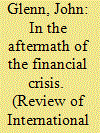

|
|
|
|
|
| Publication |
2014.
|
| Summary/Abstract |
This article examines the financial reforms that have been undertaken through two perspectives on risk: that of Beck's world risk society and an alternative Foucauldian approach. The former argues that, catastrophes such as the recent financial crisis will induce a political shift towards a cosmopolitan form of statehood. Yet, the lack of radical reform since the financial crisis would suggest otherwise. The article therefore argues that what we are witnessing is best understood in terms of reflexive governance in which the various rationalities of risk are reassessed and strengthened in order to avoid a similar occurrence in the future. Moreover, in response to the uncertainty that surrounds such rare events, more intense forms of surveillance have been adopted with the objective of pre-empting any future crisis. Yet, for various reasons, the reforms remain rather limited and the new rationality of pre-emption is unlikely to prevent further crises from occurring in the future.
|
|
|
|
|
|
|
|
|
|
|
|
|
|
|
|
| 7 |
ID:
090961
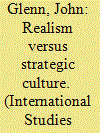

|
|
|
|
|
| Publication |
2009.
|
| Summary/Abstract |
This paper takes as its starting point the possibility of empirical and theoretical cross-fertilization between strategic culturalists and realists. Indeed, recent neoclassical realist writings indicate that there is currently a move away from the more abstract theorizing of Waltzian neorealism. In order to conduct detailed foreign policy analysis, these authors have included an increasing array of variables including nonmaterial factors. The paper argues that much can be gained from examination of the alternative explanations of state behavior provided by strategic culture and neoclassical realism. Yet the benefits of competitive collaboration depend upon the particular conception of strategic culture under consideration. The paper identifies four main conceptions of strategic culture and examines the type of collaboration with neoclassical realism that is possible for each one.
|
|
|
|
|
|
|
|
|
|
|
|
|
|
|
|
| 8 |
ID:
147961
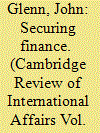

|
|
|
|
|
| Summary/Abstract |
This paper examines the changes that have been made to the global financial architecture in the aftermath of the financial crisis and argues that the reforms are confronted with a paradox. Intervention is required to ensure the smooth running of the economy, yet too heavy a hand risks disrupting a central circuit of capital. We have recently witnessed a tightening of the regulatory mechanism such that the parameters of risk taking have been reduced—financial activity now modulates within a more risk adverse environment. Yet, the reforms are not as radical as they could have been, reflecting the need to ensure effective and efficient circulation within an increasingly important area of the economy. However, a stronger emphasis on pre-emptive surveillance has emerged, which may partly compensate for the lack of radical reforms in other areas.
|
|
|
|
|
|
|
|
|
|
|
|
|
|
|
|
| 9 |
ID:
000460
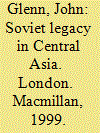

|
|
|
|
|
| Publication |
London, Macmillan, 1999.
|
| Description |
xxii,198p.
|
| Standard Number |
0333733592
|
|
|
|
|
|
|
|
|
|
|
|
Copies: C:1/I:0,R:0,Q:0
Circulation
| Accession# | Call# | Current Location | Status | Policy | Location |
| 041797 | 320.540958/GLE 041797 | Main | On Shelf | General | |
|
|
|
|
| 10 |
ID:
111593
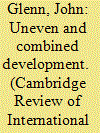

|
|
|
|
|
| Publication |
2012.
|
| Summary/Abstract |
Although Justin Rosenberg's academic writings have from the very beginning attempted to provide an alternative to neorealism in the form of Trotsky's theory of uneven and combined development (U&CD), his attempts at actually replacing it with a general theory of his own have been relatively recent. His initial attempts raised much interest and several responses. In his latest paper, 'Basic problems in the theory of uneven and combined development, part II: unevenness and political multiplicity' (Cambridge Review of International Affairs, 23:1, 2010, 165-189), Rosenberg acknowledges that in actual fact, despite his attempts to provide an alternative to neorealism, his own theory presupposed political multiplicity, and therefore in his latest article he has sought to rectify this by providing an account of the emergence of 'politically fragmented space' which is explicitly grounded in historical materialism (Pozo-Martin, Cambridge Review of International Affairs, 20:4, 2007, 554). As such, it is to be welcomed. However, this article argues that if we are to accept Rosenberg's theory of the emergence of multiplicity then it must provide a better explanation than other competing accounts. By using an alternative explanation of the rise of the international, this article demonstrates that Rosenberg's paper has failed to do this, and instead argues for the existence of a transhistorical anarchic environment arising from social rather than political multiplicity. However, U&CD is then used to explain both the intra- and inter-societal stratifications (the latter in terms of distributional structure) that arise. Associated with these stratifications is the inextricable intertwining of the modes of production and modes of inter-state competition. From this combination emerges the general tendencies of societal development, which then need to be applied to the concrete circumstances of history. In so doing, we need to account for the different analytical registers of genesis, structure, epoch and conjuncture and the unique concatenation of factors that pertain for each of these (Callinicos, International Politics, 6:3, 2005, 362).
|
|
|
|
|
|
|
|
|
|
|
|
|
|
|
|
| 11 |
ID:
087459
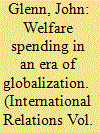

|
|
|
|
|
| Publication |
2009.
|
| Summary/Abstract |
This paper examines the assertion that economic globalization has led to the decline of welfare spending in recent decades. Although it is often argued that the increasing intensity of globalization has led to such a decline in the industrialized states, the paper finds that there has been little, if any, downturn in either levels of state expenditure in general or in levels of welfare spending in particular. However, the experience of the developing states has been rather different. In their case, the last few decades indicate that stagnation or a decline in welfare spending has occurred, particularly during the period of structural adjustment implementation. It is argued that the OECD countries still manage to provide a high level of social welfare to their populations that closely resembles the compensatory state model. In contradistinction, many of the states in the South have struggled to maintain their levels of social expenditure and therefore most resemble Cerny's competitive state model. In order to explain these two divergent outcomes, the paper examines the way in which the behaviour of certain key international financial actors (investors, multinational companies, international financial institutions) differs with regard to these two sets of countries.
|
|
|
|
|
|
|
|
|
|
|
|
|
|
|
|
|
|
|
|
|